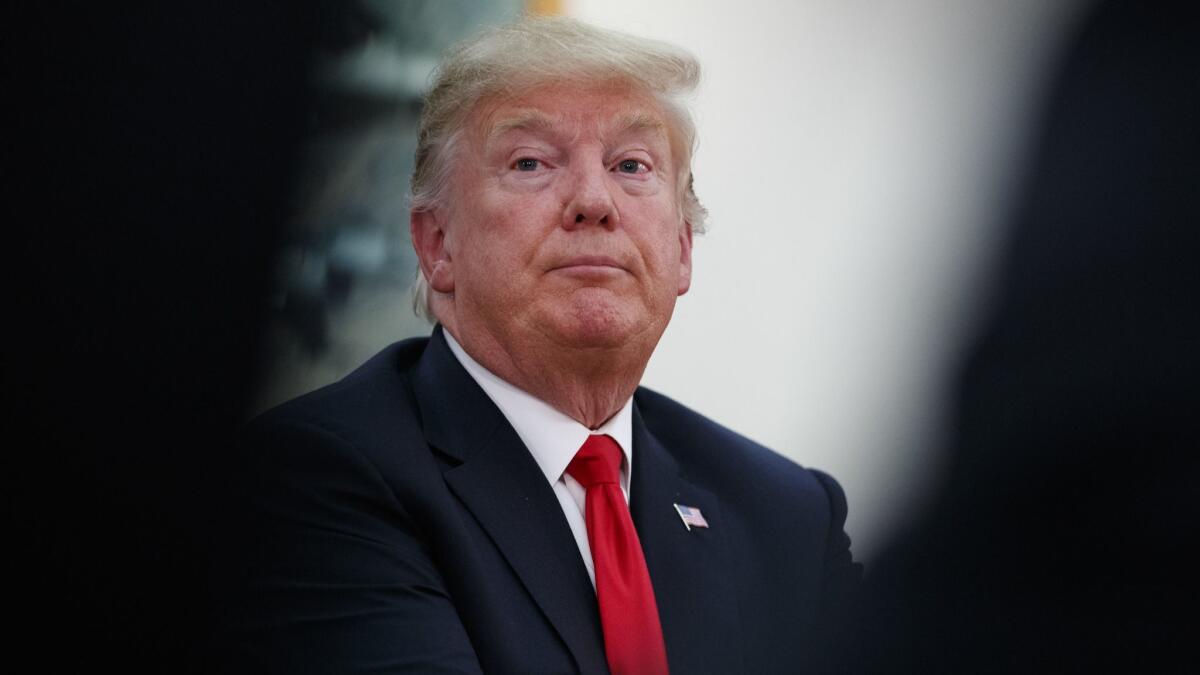Editorial: Trump’s Iran obsession gives the Saudis a blank check

- Share via
Congress is properly pushing back against U.S. support for the savage war Saudi Arabia and its allies have waged in Yemen, which has killed tens of thousands of civilians. On Wednesday, the House voted 248 to 177 to invoke authority under the 1973 War Powers Resolution to withdraw U.S. forces from any involvement in the Yemen conflict.
Even if the Senate follows suit, President Trump probably would veto the resolution. The White House argues that the War Powers Resolution doesn’t apply because U.S. forces aren’t involved in “hostilities” in Yemen, where Saudi Arabia and its allies are fighting on behalf of an internationally recognized government against Houthi insurgents supported by Iran. The U.S. role is limited to providing intelligence and supplying weapons. (In the past, the U.S. also refueled Saudi fighter planes.)
Still, opposition in Congress could put additional pressure on the Saudis to honor a shaky cease-fire and support negotiations on a political settlement. Unfortunately, Saudi Arabia under the leadership of Crown Prince Mohammed bin Salman has good reason to think that this administration will continue to give it the benefit of the doubt — and not just on Yemen.
A free ride for Saudi Arabia may be the most conspicuous consequence of the administration’s obsession with Iran, but it’s not the only one.
Part of the problem is that Trump, that most transactional of presidents, sees the economic relationship between the United States and Saudi Arabia as a good deal — so good that he has all but said that spending by the Saudis on U.S. weapons and other goods and services is a reason to overlook the likely complicity of the crown prince in the murder of Saudi journalist Jamal Khashoggi in Turkey last October.
Trump isn’t alone in being reluctant to confront the question of the crown prince’s culpability. On Wednesday, Secretary of State Michael R. Pompeo became annoyed when a reporter asked him if he agreed with the CIA’s assessment that the crown prince probably played a role in Khashoggi’s killing. Calling it a “ridiculous question,” Pompeo claimed that “as the facts are developed, as we learn more, we will hold everyone responsible for the murder of Jamal Khashoggi accountable.”
That’s hard to believe. The administration failed to act on a demand issued by Congress under the Global Magnitsky Human Rights Accountability Act for a report on whether the crown prince is personally responsible for Khashoggi’s death.
The indulgence the administration shows to Saudi Arabia isn’t totally a matter of dollars-and-cents calculation. It also reflects the administration’s fear and loathing of the Islamic Republic of Iran. (In fact, the statement Trump released after Khashoggi’s killing criticized Iran’s “bloody proxy war against Saudi Arabia in Yemen” before it got around to mentioning the journalist’s death.) If Iran must be opposed as uniquely evil, the administration seems to think, then Saudi Arabia, its regional competitor, must be embraced, regardless of its misdeeds.
Of course, the U.S. must deal with the real threats Iran poses to regional stability, including its support for militant movements, such as Hamas and Hezbollah, that the U.S. regards as terrorist groups. The administration is also right to chastise Iran (and Saudi Arabia, for that matter) for repressing dissent.
But the Trump administration has become monomaniacally focused on Iran. In a speech Thursday in Warsaw, Vice President Mike Pence claimed that Iran “openly advocates another Holocaust and seeks the means to achieve it.” In a line that seemed tailor-made to appeal to Arab nations, he added that “Iran seeks to re-create the ancient Persian Empire under the modern dictatorship of the ayatollahs.”
Enter the Fray: First takes on the news of the minute »
One doesn’t have to ignore Iran’s provocations to see this as a dangerously one-sided view that limits U.S. influence in the region. For example, although Pence cited Iraq as a place where Iran was exercising malign influence through militias outside the Iraqi government’s control, many Shiite Muslims in Iraq will be alienated by the U.S. demonization of Iran.
The administration’s Iran obsession has also strained relations with America’s European allies. After Trump withdrew the U.S. from the international agreement that placed limitations on Iran’s nuclear program, European nations took steps to remain faithful to the agreement, for the good reason that Iran has complied with its requirements. Their reward from the U.S. for that fidelity to an international agreement was a tongue-lashing from Pence for trying to “break American sanctions against Iran’s murderous revolutionary regime.”
A free ride for Saudi Arabia may be the most conspicuous consequence of the administration’s obsession with Iran, but it’s not the only one.
Follow the Opinion section on Twitter @latimesopinion and Facebook
More to Read
A cure for the common opinion
Get thought-provoking perspectives with our weekly newsletter.
You may occasionally receive promotional content from the Los Angeles Times.








